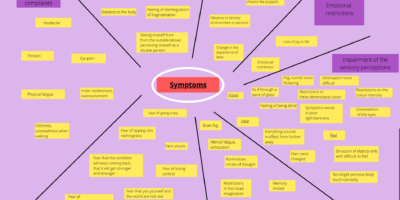Depersonalisation and Derealisation: What maintains feelings of alienation or unreality?
When depersonalisation and derealisation persist
For many people, experiences of alienation and feelings of unreality disappear on their own after a short time. However, this is not the case for everyone affected.
There are several factors that can contribute to these feelings either persisting over a long period or repeatedly occurring in a distressing manner.
These include:
“I don’t know why I have this!”
Many affected individuals experience feelings of unreality or alienation as something foreign to them. They have no idea why they, of all people, are experiencing something so unpleasant.
They reject the symptoms and do not see why they should actively do something about them. Passivity towards feelings of unreality or alienation is very common. However, many affected individuals do not realise that such an attitude does not benefit them and does not contribute to the disappearance of these unpleasant feelings.
“Maybe there is something wrong with my brain!”
Many people who repeatedly experience feelings of alienation or unreality are convinced that they are suffering from a serious illness. They consistently evaluate their symptoms in a negative light.
In reality, however, experiences of alienation are very common and represent a protective function of the body.
“I can’t think about anything else”
Many people experiencing alienation or unreality spend the entire day focusing on their symptoms. They constantly observe themselves, checking, for example, how present they feel at any given moment or frequently looking in the mirror to reassure themselves that they still exist.
As a result, these distressing symptoms take up a great deal of space. In extreme cases, affected individuals have no other mental focus. There is no longer time for other areas of life, which also diminishes their sense of joy in life.
“I am completely restricted by these symptoms!”
Most people who suffer persistently or repeatedly from feelings of alienation or unreality notice that these symptoms worsen in certain situations. Often, these include social interactions with others or stress at work or in private life. As a result, many affected individuals develop strong avoidance behaviours. They try to steer clear of these situations in an effort to minimise their symptoms. However, in the long run, this leads to an increasingly restricted life, as they are hardly able to go anywhere.
Some even give up their jobs, hoping that this distressing symptom will then disappear. However, the opposite is true: those who have nothing else to do have even more time to spend the entire day focusing on their symptoms.
“These symptoms need to go away first; then I can change something in my life!”
Many people experiencing unreality or alienation live in extremely unfavourable life conditions. These may include conflicts in relationships, cramped living situations, or exploitative working conditions.
However, many affected individuals feel that it is not worth changing these negative life circumstances. They wonder why they should bother making changes if their symptoms persist anyway.
As a result, they subordinate everything in their lives to their symptoms. They only allow themselves a better life once the symptoms have disappeared.
In reality, however, these symptoms should be understood as a protective mechanism against negative aspects or life situations. Thus, a disappearance of the symptoms can only be expected once these adverse life conditions have been changed.
Don’t wait too long! Take action if feelings of unreality or alienation persist or keep recurring.

Schreibe eine Antwort